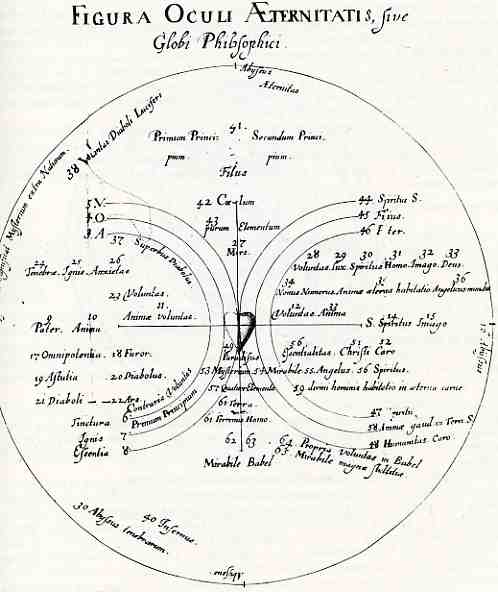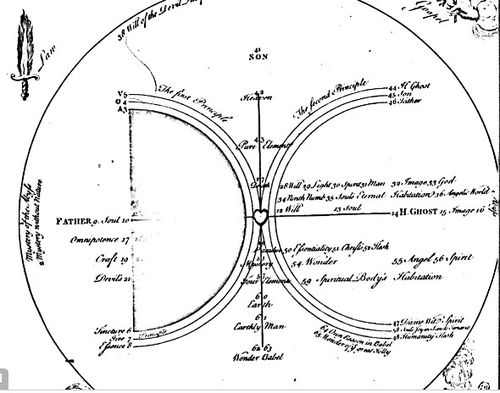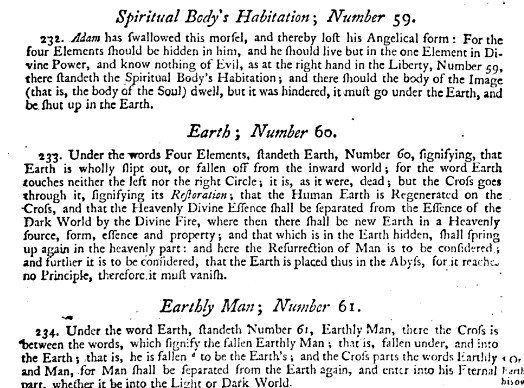JF Ptak Science Books LLC Post 546
 This solar-systemesque plan of the human soul appeared in Johannes Werdenhagen's translation of the expansive Jakob Boehme's Psychologia [graece] vera I[oanni] B[oemi] T[eutonici] XL quaestionibus explicata, printed in Amsterdam in 1632. Boehme's (1575-1624) original work waited for 8 years following his death to appear in print in any form, fearing during his lifetime that perhaps some retribution for his barrier bending work might find him--and it turns out to have been true, as this book (and the only one of Boehme's subsequently published works) made its way onto the Roman Index in 1633. Boehme was a mystical panthesist and psychic who blended the Kabbbalah, Valentin Weigel, Paracelsus and the Bible in doses wide and narrow, finding his own advanced-Lutheran voice in works concerned with sin, evil and redemption, populated with angels and grace and on and on, in a world view far-reaching and way to complex to go into here.
This solar-systemesque plan of the human soul appeared in Johannes Werdenhagen's translation of the expansive Jakob Boehme's Psychologia [graece] vera I[oanni] B[oemi] T[eutonici] XL quaestionibus explicata, printed in Amsterdam in 1632. Boehme's (1575-1624) original work waited for 8 years following his death to appear in print in any form, fearing during his lifetime that perhaps some retribution for his barrier bending work might find him--and it turns out to have been true, as this book (and the only one of Boehme's subsequently published works) made its way onto the Roman Index in 1633. Boehme was a mystical panthesist and psychic who blended the Kabbbalah, Valentin Weigel, Paracelsus and the Bible in doses wide and narrow, finding his own advanced-Lutheran voice in works concerned with sin, evil and redemption, populated with angels and grace and on and on, in a world view far-reaching and way to complex to go into here.
Part of that philosophy is displayed in this map of the soul, found in Psychologia--it would've been fairly impenetrable to me had I not found an English translation (below) of the image, published in Forty Questions Concerning the Soule in 1655.
I thought that I was going to try to make a summary of the map, but, honestly, it is too just involved and intertwined and complex to do this quickly, so I'll just let whoever cares to have a go at it under their own steam. I will point out that the major geographical feature here is the cross at center, which is actually Christ's crucifix and the great delineator of the system of the soul. But this is a gross simplification of the work of an unschooled man who rose to be a cobbler before compiling his remarkable set of ideas. I've included a few explanations of the 63 items incorporated in the map--it is a difficult go, particularly since this was part of only the first of the forty questions addressed in the book.
*Another example of Boehme's style of writing:
"For he that will say, I have a Will, and would willingly do Good,
but the earthly Flesh which I carry about me, keepeth me back, so that
I cannot; yet I shall be saved by Grace, for the Merits of Christ. I
comfort myself with his Merit and Sufferings; who will receive me of
mere Grace, without any Merits of my own, and forgive me my Sins.
Such a one, I say, is like a Man that knoweth what Food is good for his
Health, yet will not eat of it, but eateth Poison instead thereof, from
whence Sickness and Death, will certainly follow





Jakob Böhme (probably April 24, 1575[1] – November 17, 1624) was a German Christian mystic and theologian. He is considered an original thinker within the Lutheran tradition. In seventeenth-century England, he was also known as Jacob Behmen, the corrupted surname approximating the contemporary pronunciation of the German 'Bohme'.
Posted by: tin whiskers | 13 April 2009 at 03:19 AM